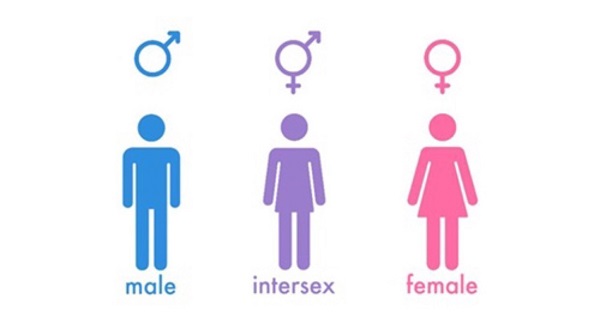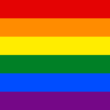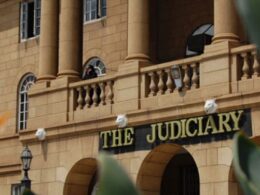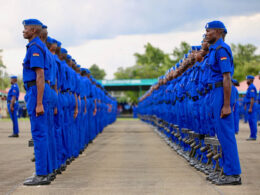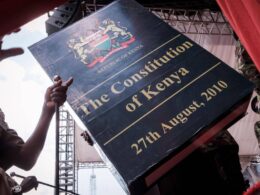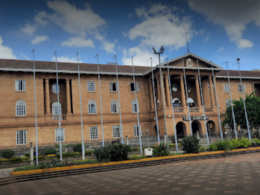By Wallace .M. Nderu
Of Intersex Persons, Identity, Recognition and the Law; Born this Way
Introduction
Human beings are diverse, we differ in numerous ways to include our appearances, geographical placing, gender, sexual orientation among many others. We are never a mirror image of each other, we are all different as we come, and this is a fact well entrenched in our lives and recorded throughout history. When we are born, our parents and the greater society anticipate eagerly to know the sex of the baby, is it a girl or a boy? In present times with advent of baby showers, most parents, go to the lengths of having the sex of the baby known, so as to be sure what to expect. At the time of the baby showers, they already anticipate what gifts are to be brought given the sex of the baby. This also ties it down to traditions, where roles are defined by sex, where girls carry on chores that differ from those of the boys, but times have since been changing in relation to this. Almost every parent takes pride in introducing their children as ‘my son, my daughter’, a very important question I pose here, what happens when the sex of the baby is not well defined or one is assigned the wrong gender?
Some children are born but their sex is not immediately definite at the time of birth, they cannot be placed in it’s at boy or girl category, they are known as intersex. In a country where her people have numerous beliefs and superstitions it thus becomes difficult to have honest conversations about the subject. Where curses will be the foundation upon which the blame will be anchored why a child is born intersex, the greater society will then shun this human being in fear of being associated with a ‘cursed creature’. Fear of the unknown is a disease that has ailed many, and many have refused its treatment, gain the relevant knowledge on the given subject. We live in a society that does not appreciate different, where anything that does not conform to the norm as was set, then is wrong, evil and it is frowned upon. We fear to have honest conversations of issues that are glaring in our face, we tend to burry our heads in the sand and wish it away, but it would not happen, instead of tackling issues as they emerge, we tend to sweep them under the carpet, and hope they will be forgotten. Ignorance has crippled the logical thinking of many, where they don’t interrogate beyond what they have heard through grapevine or what was passed down from generation to generation. We were put in a box with norms set, and anyone who dares look beyond the box attracts trouble upon themselves, at what point then, I do ask, will Kenya and her people look beyond the horizon and live with the reality of the current times.
An intersex, simply defined, is a person born with a combination of male and female biological characteristics, such as chromosomes or genitals that can make doctors unable to assign their sex as distinctly male or female.1 This can also be hormonal or gonadal. For a long time intersex persons were categorized within the LGBTI (now Q +), sexual minorities, and given the subject not only in this country but throughout the African region, with and exception of a few, it could not be tolerated. Recognition of intersex persons thus became difficult because in the minds of many what was being championed was deemed to be unAfrican (whatever this may mean), as such many intersex persons have, unfortunately not for their doing, suffered immeasurable pain.
Every parent, as a natural instinct, will protect their offspring from whatever danger that may loom and threaten their existence. This is the reason bolted deep on the beam that is allowing for ‘corrective’ surgeries on children so as to assign them a gender, as is the norm, these surgeries are the relief the parent seeks to have, so that they can offer their children to live, within the confines of societal expectations, as either a boy or a girl. It can be argued that given these surgeries are carried on by professionals after tests having be run, they should be encouraged, it being argued they see a child protected from being deemed to be cursed and in worse scenarios killed. But are they done for the best interest of the child or the parent? Where wrong gender is assigned to a child at birth, how then are they expected to live for the rest of their lives, how are they to navigate the psychological distress? There are many questions that linger but the answers are few.
It is estimated that between 1.7% and 3.0% of the global population is intersex. In Kenya, it is estimated that at least 1.4 million of her people are intersex, this again has not been verified.
There has been a crop of persons who have been against recognition of intersex persons arguing that it would be an introduction of a third gender beyond the two ‘conventional’ male and female. Sadly, even some religious leaders are at the epicenter of discouraging this, their argument, of course rooted on religion, that God made no mistake, how then can we make progress in the recognition and protection of intersex persons? There are also those who argue that a flood gate would be opened, where unAfrican behaviour would be allowed in this largely conservative society.
This opinion seeks to indicate the reasons why the recognition of intersex persons is critical and called for.
Identity
Critical to a being’s existence is identity. Identity is the fact of being who a person is. We are diverse and a contribution to this diversity is the reality that we are distinct in our identification. Life accords us an opportunity to identify who we are and it normally happens after birth, where one is born a girl will identify as female and boy male, generally speaking.
Intersex people are not accorded an opportunity to choose their own identity at birth, at least for the greater majority, a gender is assigned to them after the ‘corrective’ surgery and whichever they are accorded is who they are to identify as throughout their lives. The question is, what happens where a child is accorded the wrong gender? Where one is brought up as a boy but they aren’t, and the vice versa, they are chained to the identity they are assigned. What does this in turn do to them as they grow up and realise they are not who they have been made to identify as, given that their families, friends and the greater society will associate and know them based on the identity they were assigned. It thus becomes difficult for them to adjust to the reality that this boy is not a boy but a girl and vice versa, this sadly fuels the ignorance and propelling of unsubstantiated beliefs and superstitions.
We are living at a time where more and more individuals are choosing identities that are not the usual ‘conventional’, and this is a reality we are living in.
Identity crops also in our identification documents primarily. At birth, a certificate of birth is issued, among other details included are the sex of the child and a name. The names we bare are influenced by our sex, whether male or female, what happens then where a child is born intersex, they are entitled to a name, how then does the name come about? Given my discussion above, a parent will do whatever it takes to protect their offspring, and this will include agreeing to ‘corrective/reconstructive’ surgeries, then they can ‘proudly’ say this is my son, he is called ‘Tim’. What then happens where ‘Tim’ is not ‘Tim’ and ‘he’ was made to identify as such, this thus becomes a breeding ground for mental anguish and torture that also propels hatred and unsubstantiated abuse, both verbal and physical.
Article 6 of the African Charter on the Rights and Welfare of the Child provides; every child has the right to be named and registered at birth. Article 7 of the United Nations Convention on the Rights of the Child also provide; children have the right to a legally registered name and nationality. This is a right every child has, and yes it has been accorded to them as they are registered and named after birth, my concern is the intersex child. They have to be registered too, at birth and given a name, what maker is entered in the registration form, what name do they get? Certainly not a unisex name as most parents will accord a name based on the sex. This feeds into the bigger picture of identity. The challenge thus comes in when the child grows up and they have to now identify as who they really are, and the process of changing their given names so as to realign with who they are, the process thus becomes long and tedious.
Almost every other identification documentation, in Kenya, requires a sex maker and a name, the national identification card, passport, NHIF cards, academic certificates to include KCPE and KCSE, etc. We have to bear in mind that for one to access these documentations one has to have a certificate of birth, this is the primary source of identification after birth, thus the anchor upon which largely our identity is premised. This then raises fundamental questions which need to be addressed expeditiously.
It is important that intersex persons are accorded the chance to be allowed to choose their own identity, an identity they will be comfortable with, and one that defines who they are truly. It is sad, really, that most intersex persons cannot access most of the documentations, as an example, because they don’t fall within what is considered the normal gender binary that would speak to their identity.
In my opinion, despite the fact parents want to protect their intersex children, by giving them an identity through the ‘corrective’ surgeries, they should not be done until it is certain who they are. There is a need to preserve the dignity of each individual to include intersex as we are human beings. There are sad stories of children assigned the wrong gender, a decision that was beyond their control.
In my opinion, no one should be robbed of their identity, regardless of set societal norms. It is important that every human being be accorded the opportunity to identify as who they truly are, who they were born being.
Recognition
A simple and honest question I pose is that, are intersex persons recognized in Kenya? Though many may have divergent responses, mine is a clear and honest no. As indicated above, society in its very nature does not accept easily that which is different from the norms that we set since time immemorial. Where a child is born intersex, it is premised on superstitions, and beliefs of a people who don’t really care to learn more about it. How then can one state that intersex persons are recognized, if the society deems them to be a curse, how can parents of intersex children speak out freely about them, without they being referred to be bad omens. There is a difference in knowing that there are intersex persons born and recognizing them, medical practitioners will know of this as well as a few others who care to be informed about the topic.
From birth, they are not recognized, why? The Registration of Births and Deaths Act4 under section 2 on interpretation, ‘prescribed particulars’ is defined as, at the time of birth, among others, the name and sex of the baby. The set gender markers recognized are either female or male, there is no in between. In some instances, a question mark (?) is inserted where the gender of the baby is not known, what is this to mean? This is a clear indication that intersex children are not recognized under the law. The law should have provided for a clear guide on how intersex children are to be registered at birth, but it hasn’t, this again answers the question to the fact that they are not recognized. This will largely inform the ‘corrective/normalizing surgery’ so as to have the baby assigned a gender that will inform their name and gender marker on their certificate of birth.
Section 8 of the above stated statute, provides, a registrar shall not register a birth or death after the expiration of six months from the date of such birth or death, except upon receiving the written authority of the Principal Registrar issued in accordance with the rules, and upon payment of the prescribed fee. The fault I have with this section is that, the period accorded for the registration after birth is not enough to allow the child develop and their true gender disclosed. This again goes to show that there is no recognition of intersex persons as at the time of birth, if they were recognized, a proviso to this section should have been included to state where a child is born intersex, and this should be the period of registration. This however is not the case.
Section 14 of the stated law provides for change of name after registration and states; where the birth of any child has been registered before it has received a name, or where the name by which it was registered is altered, the parent or guardian of such child may within two years of the registration, on payment of the prescribed fee, and on providing such evidence as the registrar may think necessary, register the name that has been given to the child. The law acknowledges that the name of a child can be changed, and can be done within a period of two years, the law does not provide the change of a gender marker if the one entered does indicate the real and actual sex of the baby. This again goes to show that there is no recognition of intersex persons in Kenya.
The Persons deprived of Liberty Act6 makes an attempt to recognize intersex persons, section 2 on interpretation, intersex is defined as a person certified by a competent medical practitioner to have both male and female reproductive organs. In my opinion this definition is vague, why, the drafters were not informed that intersex persons are not only born with both male and female reproductive organs, that there are others it is hormonal, gonadal or chromosomal. What then happens to them? The certificate that would be issued by this medical practitioner, would it replace the certificate of birth as is required under the law, or are they to be used concurrently? These are fundamental questions in relation to the certificate issued because, what then happens to the section the gender marker is to be filled, does this other certificate negate that requirement? The drafters of the law did not take quit a significant number of issues into consideration in providing for this definition, it is too broad and vague, in my opinion.
It is no doubt that most people will be in conflict with the law, and when this occurs and they are arrested, in most cases where they cannot provide for the required bond, they will be held either in a police station or remand facility. Intersex persons are no exceptions to this, and where they are remanded will be informed by their physical appearances, where it is a man, he will be kept in a male cell and vice versa, what then happens where they are intersex? They will be held in these cells, and when it is discovered who they are, then the abuse commences. If there was recognition of intersex persons, then the law should have been very clear on their remand or holding cells, however this is not the case.
Recognition also lacks in our education system, where a child is intersex more often than not they will sent away. Where such children will be accused of brining on board behaviour that is un-African, and this is largely premised on the fact that many are ignorant to the fact that there are intersex persons. Where such children are sent away from school, their right to a basic, free and compulsory education is violated as provided under the Constitution and the Basic Education Act.
The lack of recognition is not only limited to the education sector, but in an everyday setting, at our various places of worship, detention facilities, work places and the general societal set up. What does this then in turn do to persons who are intersex, or parents who have intersex children? The answer here, they will hid and shun away from speaking, sharing their truths, they are will always be hiding in the shadows, hoping no one ever gets to know. This in turn propels the taboo, bad omen, and curse song, where majority of people will never get to learn about intersex persons, who are humans just like them.
In my opinion, it’s a high time that we had an honest conversation on the introduction of sex (to include sexuality) education in our education curriculum. We cannot shy away from telling the truth, so that the coming generations will be more informed and knowledgeable on the topic.
I do appreciate the few that have come out to support this cause, to include the registration of the Intersex Society of Kenya, registered as a society, this in my opinion I can say is part of the recognition. There is also a taskforce9 in place to look into, legal, administrative and policy reforms in relation to intersex persons in Kenya, this in my opinion is also a step taken in the recognition of intersex persons.
Failure to recognize intersex persons has seen their rights violated, and from the stories they have shared, many have suffered an unsubstantiated amount to pain and suffering. There is a need to break the shackles of beliefs and superstitions that bar the people from learning the truth, that intersex persons are indeed human just like them and are not curses or bad omens. There is a need to create awareness from the grass roots, then we can start building on the recognition. There is a need for this recognition, so as to protect, respect and uphold the rights intersex persons.
The Law
The Constitution of Kenya, 2010.
The Constitution is the supreme law of the land, it can be considered the soul of her people as it dictates their wishes and desires. The Kenyan Constitution, 2010, has a robust Bill of Rights well enshrined in Chapter Four, these rights are guaranteed for every being and there are no exceptions. However, intersex persons have seen their human rights as guaranteed to them violated, propelled by ignorance, crude beliefs and superstitions. Their rights have been trodden upon because a majority do not acknowledge that they are human beings with rights. It is sad, listening to their (intersex) stories, tales of sorrow and pity of how they have lived difficult lives, not for their own doing or making.
Article 19 (2) provides that the purpose of recognising and protecting human rights and fundamental freedoms is to preserve the dignity of individuals and communities and to promote social justice and the realisation of the potential of all human beings. This Article makes mention of individuals and all human beings, this is to include persons born intersex, there is no exception to this and the wording is clear. This article is an assurance that there is a need to recognize and protect human rights and fundamental freedoms to preserve the dignity […], promote social justice […] and realisation […], despite this guarantee, rights of intersex persons have been violated, abused and denied, their dignity trampled upon, and a hindrance placed that bars the promotion of social justice on their accord.
Sub Article (3) (a) provides that rights and fundamental freedoms in the Bill of Rights belong to each individual and are not granted by the State. This is clear, that the State does not grant any rights, they crop from the Constitution and they are for every individual with no exceptions.
Article 20 (2) states that every person shall enjoy the rights and fundamental freedoms in the Bill of Rights to the greatest extent consistent with the nature of the right or fundamental freedom. This again, is a clear indication that every person, to include intersex persons has to enjoy their rights and freedoms, shall, doesn’t mean there is an option, it is compulsory.
Article 21 (1) provides that it is a fundamental duty of the State and every State organ to observe, respect, protect, promote and fulfil the rights and fundamental freedoms in the Bill of Rights. The observance, the protection, promotion and fulfillment of these rights and freedoms is be accorded to everyone, with no exceptions to include intersex persons. Sadly, intersex persons are denied some of the basic and fundamental rights based on who they are born being, it thus is the duty of the State and its organs to ensure that these rights are fully realized.
What are some of the rights that are violated in relation to intersex persons?
Article 26 (1) states that every person has the right to life. This right is inherent and cannot be denied arbitrarily. Given the beliefs as discussed earlier above and the curses and bad omens are the justifications offered for eliminating a child born intersex. It is a fact, though it may have or have not been documented that there are people and communities that will kill an intersex person so as to rid catastrophes that would otherwise pour on them given the ‘curse’. This has been fueled by ignorance, crude beliefs and unsubstantiated superstations. If the great society at large recognized intersex persons and that they are humans just like everyone else, then this right would not violated and abused when it comes to intersex persons. No one has the right to decide who lives and who doesn’t regardless of who they are. There is a need to embrace diversity, bearing in mind that we are all different.
Article 27 (1) dictates that every person is equal before the law and has the right to equal protection and equal benefit of the law. Sub article (2) further stipulates that equality includes the full and equal enjoyment of all rights and fundamental freedoms. Though this are the clear dictates of the supreme law, the same have not been realised for intersex persons, why? How would this be a reality to a group of persons that have not recognized as human beings, part of the greater society? There is a need to have intersex persons recognized, for their rights, which are human rights to be fully appreciated, respected, upheld and promoted.
Article 28 makes it clear that every person has inherent dignity and the right to have that dignity respected and protected. When intersex persons are subjected to ridicule for who they were born, when ‘corrective’ surgeries are carried on them, non-consensually, seeing them loose their identity, where they are forced to live their lives in the shadows, afraid, where they are forced to show their bodies, for ignorant persons to see their anatomy, how then can it be said that their dignity is protected and respected? Every person doesn’t make an exception, it encompasses every being that is human and traverses this country, squarely within every person are intersex persons, and they are not less of humans that they are excluded from this grouping. The recognition of intersex person will be a critical starting point to respecting and protecting their dignity, they are not an exception to the rule and as such this right as guaranteed under the Constitution should not be violated any further.
Article 29 ensures that there is freedom and security of the person and provides that every person has the right not to, among others, be subjected to any form of violence from either public or private sources or subjected to torture in any manner, whether physical or psychological. It is a fact, from the numerous stories of the few brave souls that have told their tales, that intersex persons are subjected to physical violence. It is no doubt again that they undergo psychological torture for being born who they are, more often than not they have no idea what is going on and those that do, the cruelty of the world pushes them to want to do the worst to include attempting suicide. Where a people in society, are ignorant of the diversity we have, where they don’t appreciate that intersex are human beings too, this right as guaranteed under the Supreme Law will continuously be violated. No human being is to be subjected to physical violence and/or psychological torture, regardless of who they are. Intersex are people too, and they have rights and these are not mere writings on pieces of paper, but they are to be actualized, respected, upheld and protected.
Article 53 provides that every child has the right to a name and nationality from birth, free and compulsory basic education, be protected from abuse, neglect, harmful cultural practices, all forms of violence, inhuman treatment and punishment and also to parental care and protection. Despite the clear wording of the Constitution, there are children that are denied some basic and fundamental rights as encompassed in it. There are children that have been sent away from school because of them being intersex, denying their right to basic and compulsory education, others are lucky to complete their studies. The stigma attached to it makes it difficult for some of them, to even concentrate in their studies and work towards finishing and working towards a great future.
A child is to have a name, at birth, as discussed above, what happens to a child born intersex? The ‘corrective’ surgeries are carried on, this aggravates the situation, to include robbing this child an identity and future. There is a need to have recognition of intersex persons, then this will be a step towards preserving their dignity as human beings. It is a Constitutional requirement under this article that these are to be upheld, thus it is important that children are protected not only by their parents but also the greater society, from violence, inhuman treatment neglect, and abuse just because they were born intersex. This will greatly reduce the stigma attached to it, it will add to the peace of mind that they so deserve, they need to be liberated from horrors they have been subjected to for being born who they are.
Article 10 on national values and principles of governance provides that among others, human dignity, equity, social justice, inclusiveness equality, human rights, non-discrimination and protection of the marginalised as some of the values and principles. These values and principles of governance cannot be achieved where a part of the citizenry are not recognized, where their rights are violated and human dignity tramped upon. It is the duty of the State and every individual to ensure that this values and principles are actualized and encompass all to include intersex people, who are also human beings, it is not enough to have a list of well set out values and the same are not implemented for benefit of all with, an exclusion of no one.
Article 33 in my opinion, this is a powerful right that can be used to create awareness on intersex persons. It provides that every person has the right to freedom of expression which includes the freedom to seek, receive, or impart information or ideas. I am alive to the fact that majority of the Kenyan citizenry are ignorant on all matters intersex, where they run from the fact that they are born that way and opt to stick to their beliefs and superstitions on curses and bad omens.
There is need for the greater public to be well informed on every topic intersex, this will enlighten them, thus being a step towards recognition that they are human too. This will also see their rights protected, respected and upheld, sending a message we are all different and diverse as we come and they can start appreciating this fact.
Article 35 provides form access to information, which I believe is very significant in advancing the recognition of intersex persons. In my opinion, medical practitioners with vast knowledge on the topic should provide as much information not only to the parents and guardians of intersex persons but the general public as well. Parents need to be well informed on intersex, where they are gifted with an intersex children, what is the best thing to do in relation to their child, before any surgery is carried out on them. An informed citizenry is better placed to deal with the reality, and this can be achieved where information can be shared and knowledge enhanced in relation to intersex persons.
Intersex persons are human beings as such the numerous rights enshrined in the various Regional and International instruments, to include the African Charter on Human and Peoples Rights (Banjul Charter) and the Universal Declaration of Human Rights (UDHR), apply to them and they are to be upheld, protected and respected.
The reality
It is a reality that we are diverse, that we are distinct in the beings we thrive to be, and that we aren’t a mirror image of each other.
It is a reality that intersex persons have suffered greatly for the beings they were born, where their rights have been violated and trampled upon. Where they have suffered mental anguish laced with stigma, where they have suffered violence in the hands of the many who are ignorant of the fact that intersex are humans too. It is a reality that intersex persons, some if not all, have seen their lives ruined through the said ‘corrective’ surgeries. It is a reality that many have had to lead with an identity they don’t conform to, one that doesn’t tell the true tale of who they are.
It is a reality that the laws and policies that are in existence are not intersex conscious, and as such, to a great extent, in my opinion, have seen the advancement of the violation of rights of intersex persons.
It is a reality that many remain ignorant on the topic of intersex persons, and in my opinion, make no efforts to learn and gain relevant information. Sadly, they are stuck to their beliefs that a person born intersex is ‘cursed’ or a ‘bad omen’. It is a reality that many have suffered because of this.
It is a reality that there is a need to have recognition of intersex persons, this in my opinion, will be a stepping stone in righting the wrongs that have been occasioned to them. It will see the advancement of their rights in a society in which they belong to as human beings.
One does not need to wear the shoe to know where it pinches, living the difficult life of intersex person, through their eyes, it is compelling to stand up for a group that has long suffered and champion for their rights.
Conclusion
There is a need for the recognition of intersex persons, there is need for their rights, which are human rights to be respected, upheld and safeguarded. Time is now that there needs to be change in the law, policies and other administrative processes that have been a catalyst to the violation of intersex rights. It is important that we have honest conversations in relation to intersex, where all shall be informed and educated on the topic, where many more will and champion for the rights and recognition of intersex persons. Being alive to the fact that we are all different, and diverse as we come should be the foundation of accepting that intersex are human beings abiding to the strict definition of the term. Bearing in mind that intersex persons are born the way they are, that is their truth and it should be respected. There is a need to expel backward beliefs anchored on ignorance and unsubstantiated superstitions cemented by ignorance and have an informed citizenry on the topic, one that will see their knowledge advanced, propelling a more accepting and tolerant society.
Time for change, I believe is now, and this change is not only for the few that champion for a cause, but for all. There is a need to recognize intersex persons, preserve their dignity for a better tomorrow.
Appreciating intersex persons are human beings, it is time to end the trampling and violation of their rights and instead respect, uphold and safeguard them. History will judges harshly for failure of acting when we had a chance, when we could bring the change that is so desired on the lives of many intersex persons. To avoid this, lets act know and make the world a better place for all intersex persons.
Rights are not mere words penned on a piece of paper, they are the soul of the existence of we human beings, and they are creatures birthed after long struggles of brave men and women who championed for them. As such, they are to be enjoyed by everyone with no exceptions. In a world where human rights would be non-existence, that would be the end of humanity.
Let us recognize, respect, uphold and safeguard the rights of intersex persons.
References
1 <https://www.plannedparenthood.org/learn/sexual-orientation-gender/gender-gender-identity/whats-intersex, accessed on 10/25/2018 11:38 am>
2 http://www.klrc.go.ke/index.php/klrc-blog
3 https://www.the-star.co.ke/news/2018/06/04/intersex-dilemma-when-and-if-to-choose-surgery_c1767124 The story of Roy * on being assigned the wrong gender.
4 Cap 149 Laws of Kenya.
5 Baby A’s Case; Baby ‘A’ (Suing through the Mother E A) & another v Attorney General & 6 others [2014] eKLR Petition No 266 of 2013. < http://kenyalaw.org/caselaw/cases/view/104234/ >
6 Act No 23 of 2014
7 R.M v ATTORNEY GENERAL & 4 others [2010] eKLR Petition No 705 of 2007.
<http://kenyalaw.org/caselaw/cases/view/72818 >
8< https://www.standardmedia.co.ke/article/2001279903/family-seeks-help-for-intersex-child-after-expulsion- from-schools > A child in Nyeri County was expelled from a school for being intersex, violating the child’s right to a basic, free and compulsory education.
9 < http://www.klrc.go.ke/index.php/klrc-blog/613-taskforce-on-policy-legal-institutional-and-administrative- reforms-regarding-intersex-persons-in-kenya-blog > on The Taskforce constituted by the Attorney General in May 2017.
10 < https://www.nation.co.ke/lifestyle/family/-intersex-person/1954198-4293574-8vublvz/index.html >
11 ibid
Wallace M Nderu is an Advocate of the High Court of Kenya, Human Rights Lawyer and Queer Feminist.





